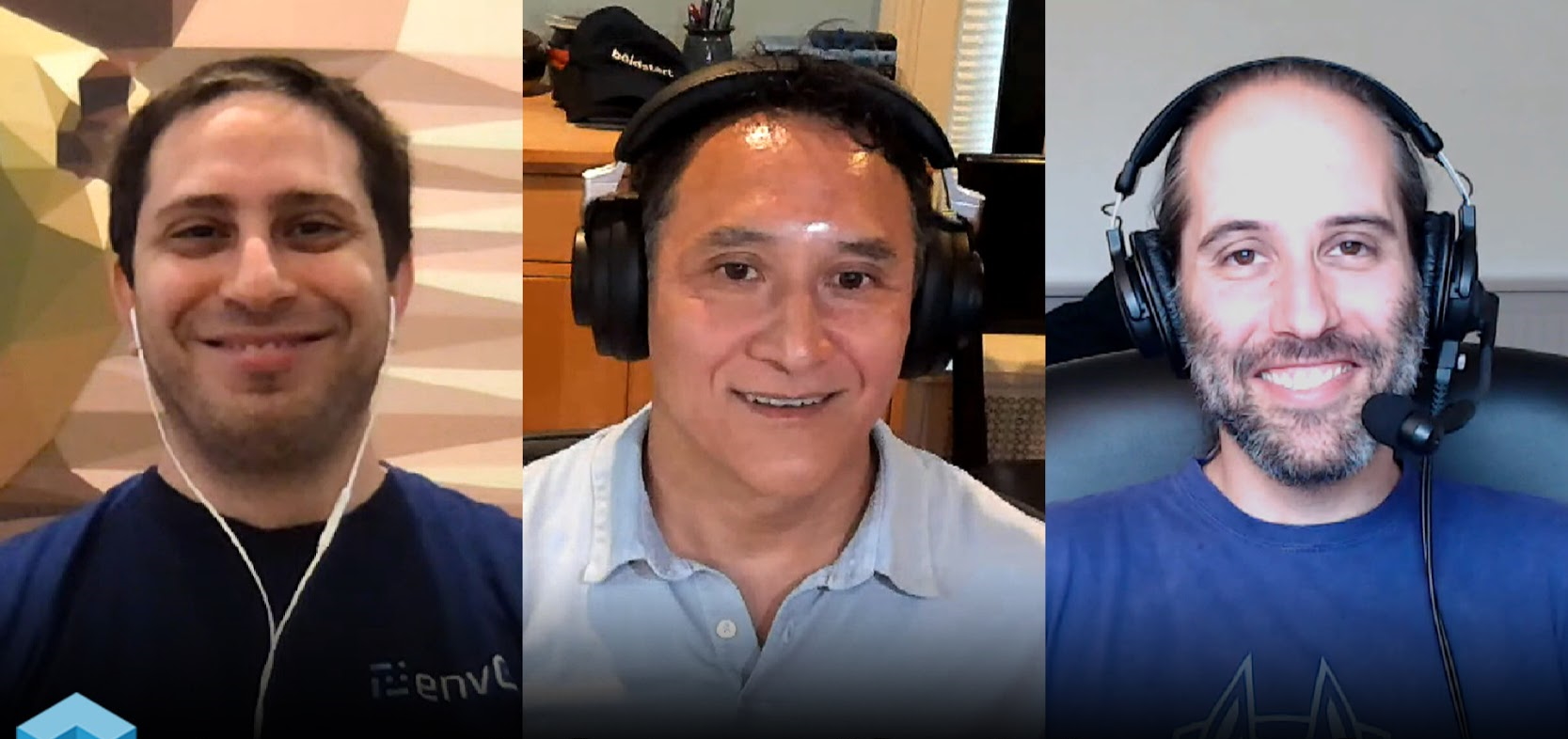 INFRA
INFRA
 INFRA
INFRA
 INFRA
INFRA
It’s hard to quantify which companies merit the label of “tech” right now. A glance across the Fortune 500 shows obvious tech giants, such as Apple and Intel. But across the board, technology has taken over business operations and has made software developers in demand at Wells Fargo & Co. as much as at Facebook Inc.
“We live in a world in which more and more activities, more and more decisions, and really more effort is rolled onto developers,” said Guy Podjarny (pictured, right), founder of Snyk Ltd.
Podiarny joined Ohad Maislish (pictured, left), co-founder and chief executive officer of env0, and Ed Sim (pictured, center), founder and managing partner of BOLDstart Ventures, for a CUBE Conversation on how to manage the complexities of infrastructure as code.
Moderating the conversation was Stu Miniman, co-host of theCUBE, SiliconANGLE Media’s livestreaming studio.
There have been three revolutions in the data center, according to Maislish. The first was the advent of virtualization at the turn of the century. Led by companies such as VMware Inc. and ZenSource Inc. (now part of Citrix Systems Inc.) ,this freed applications from the constraints of physical hardware, making scaling infrastructure a snap.
Virtualization paved the way for the second revolution: cloud computing. This was when “companies started clicking buttons in order to get those compute resources,” Maislish said. But “nobody is clicking those buttons anymore.”
Instead, developers are “writing, maintain and executing that code,” Maislish said. This is the third revolution: infrastructure as code.
“If you talk to chief information officers … developer productivity is number one, front and center,” Sim stated. They’re all looking at, ‘how do I automate my tool chain? How do I get things done faster? How do I do things more scalable? And then how do I coordinate processes amongst teams?'”
But handing more responsibility to developers comes at a cost. “Enterprises have two options,” Maislish said. “Either they go with productivity self-service or they go with governance, but they cannot have both.”
Choosing productivity means that developers are given free rein to orchestrate cloud resources without close oversight. This speeds the pipeline but entails risks in security and governance, as well as potential higher costs.
So, businesses are faced with the difficult decision of requiring developers to comply with manual approval processes. This causes delays that are disheartening to developers. And in a world where demand is sky-high, job dissatisfaction is easily cured.
“We saw developers quitting jobs at some places,” Maislish stated. “The reason was that they didn’t give them self-service, they didn’t empower those developers. They were blocked by DevOps; they needed to open tickets to do trivial things.”
This frustration was one of the reasons for founding env0. The start-up shifts DevOps bottlenecks through an engine that increases self-service infrastructure access while simultaneously simplifying infrastructure-as-code governance.
“Development is so important, it touches every aspect of an organization,” Sim said.“I always think about it as almost a collaborative workflow layer versus being reliant on kind of one-control entity. Great developers always want to move fast.”
By combining self-service with governance, ent0 enables businesses to safely hand the reins to developers while being assured that there are protective measures in place. And env0 wins out over in-house solutions because the company has the ability to identify and report problematic patterns that occur across its client base, according to Maislish.
“[We] notice what makes sense, what is problematic and give those insights and more business logic back to the customers,” he stated.
Enabling engineers to analyze how much their code is going to cost is another benefit of env0. “If we tie from the developer up to the financial operations, we will provide better service and just better business value for our customer,” Maislish added.
When it comes to cost management, companies need to shift from a top-down controlling mindset to a more bottom-up approach, “allowing the teams, the people in the trenches to actually make correct decisions,” according to Podjarny.
Whether it’s money, security or governance, developers care about performance, according to Maislish. “They know very early if they did something wrong,” he said.
This has led to the introduction of dashboards like security tool Snyk into developer labs. And, with the release of env0 as a public beta, Maislish is hoping that the solution becomes embedded into the daily workflow.
“We want developers to be happy and productive and do what they need to do — to make sure that those developers are really making good use out of their time and going back home at the end of the day feeling that they did what they were paid for, not for waiting for others to locate some cloud resources for them,” Maislish concluded.
Watch the complete video interview below, and be sure to check out more of SiliconANGLE’s and theCUBE’s CUBE Conversations.
THANK YOU